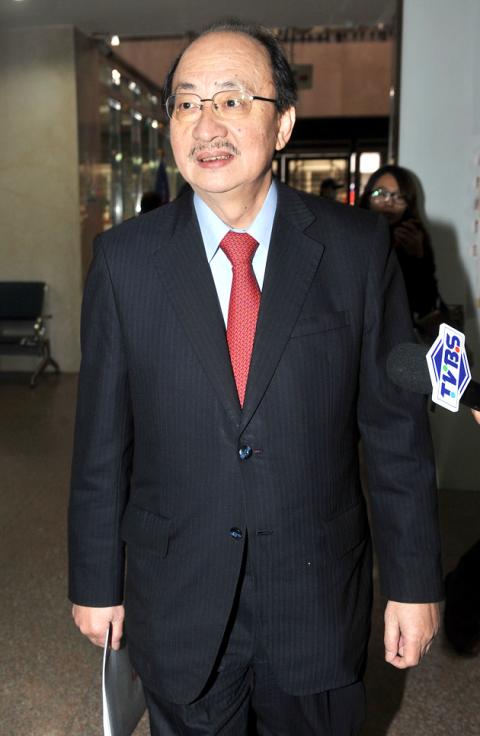Democratic Progressive Party (DPP) caucus whip Ker Chien-ming’s (柯建銘) proposal to suspend the party’s so-called “Taiwan independence clause” to boost its chances of returning to power was deemed unnecessary by his own party yesterday, but it earned rare acclaim from China.
Beijing, which rarely agrees with the DPP, praised Ker’s proposal yesterday, with Taiwan Affairs Office spokesperson Fan Liqing (范麗青) describing the caucus whip as “a man of vision” and his initiative as “a positive sign, as well as an important step in the right direction if the initiative is approved by the party.”
The “independence clause” is an article in the party’s charter that calls for the establishment of a Republic of Taiwan. Beijing has always said that the clause is a primary roadblock to it engaging with the DPP.

Photo: Chien Jung-fong, Taipei Times
However, members of the DPP, including DPP Chairman Su Tseng-chang (蘇貞昌), gave Ker’s suggestion the cold shoulder, saying that the controversial proposal was untimely and could spark an unnecessary dispute in the party and violate the spirit on which it was founded.
Su said that suspending the clause is a non-issue because the DPP views Taiwan as an independent and sovereign country given the series of constitutional amendments, presidential elections and legislative elections that have taken place over the years.
“Everyone’s opinion should be respected, but it is the consensus that matters. The consensus of Taiwanese is that the nation is sovereign and independent, and its future should be decided by the 23 million people who live here,” Su said.
Several DPP lawmakers also had reservations about Ker’s initiative, despite agreeing that everyone is entitled to their own opinion.
“Taiwan’s independence is in the DPP’s DNA and it has never changed. Changing the ideology in exchange for bilateral engagement is not smart, nor would DPP supporters accept the abrupt change,” DPP Legislator Chen Chi-mai (陳其邁) said. “Proposing suspending the independence clause before a major election is much ado about nothing. Besides, you don’t win support by abandoning your core values.”
The timing of Ker’s initiative is inappropriate because it is likely to incite an argument between the moderates and the fundamentalists in the party, DPP Legislator Huang Wei-cher (黃偉哲) said.
If the initiative was submitted on the presumption that it would facilitate engagement between the DPP and the Chinese Communist Party (CCP), doubts would inevitably arise, former vice president Annette Lu (呂秀蓮) said.
The first direct presidential election in 1996 and the follow-up DPP resolution on Taiwan’s future three years later had both established that Taiwan is a sovereign and independent nation, which “basically achieved the goal listed in the independence clause [written in 1991],” Lu said.
“The 1999 resolution on Taiwan’s future, to some extent, could be seen as a revision of the independence clause. I believe most people would find this acceptable,” she said.

The CIA has a message for Chinese government officials worried about their place in Chinese President Xi Jinping’s (習近平) government: Come work with us. The agency released two Mandarin-language videos on social media on Thursday inviting disgruntled officials to contact the CIA. The recruitment videos posted on YouTube and X racked up more than 5 million views combined in their first day. The outreach comes as CIA Director John Ratcliffe has vowed to boost the agency’s use of intelligence from human sources and its focus on China, which has recently targeted US officials with its own espionage operations. The videos are “aimed at

STEADFAST FRIEND: The bills encourage increased Taiwan-US engagement and address China’s distortion of UN Resolution 2758 to isolate Taiwan internationally The Presidential Office yesterday thanked the US House of Representatives for unanimously passing two Taiwan-related bills highlighting its solid support for Taiwan’s democracy and global participation, and for deepening bilateral relations. One of the bills, the Taiwan Assurance Implementation Act, requires the US Department of State to periodically review its guidelines for engagement with Taiwan, and report to the US Congress on the guidelines and plans to lift self-imposed limitations on US-Taiwan engagement. The other bill is the Taiwan International Solidarity Act, which clarifies that UN Resolution 2758 does not address the issue of the representation of Taiwan or its people in

US Indo-Pacific Commander Admiral Samuel Paparo on Friday expressed concern over the rate at which China is diversifying its military exercises, the Financial Times (FT) reported on Saturday. “The rates of change on the depth and breadth of their exercises is the one non-linear effect that I’ve seen in the last year that wakes me up at night or keeps me up at night,” Paparo was quoted by FT as saying while attending the annual Sedona Forum at the McCain Institute in Arizona. Paparo also expressed concern over the speed with which China was expanding its military. While the US

SHIFT: Taiwan’s better-than-expected first-quarter GDP and signs of weakness in the US have driven global capital back to emerging markets, the central bank head said The central bank yesterday blamed market speculation for the steep rise in the local currency, and urged exporters and financial institutions to stay calm and stop panic sell-offs to avoid hurting their own profitability. The nation’s top monetary policymaker said that it would step in, if necessary, to maintain order and stability in the foreign exchange market. The remarks came as the NT dollar yesterday closed up NT$0.919 to NT$30.145 against the US dollar in Taipei trading, after rising as high as NT$29.59 in intraday trading. The local currency has surged 5.85 percent against the greenback over the past two sessions, central